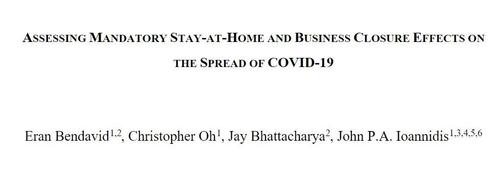Peer-Reviewed Study “Did Not Find Evidence” Lockdowns Were Effective in Stopping COVID Spread

Liberals may be able to argue with Fox News or even Republican politicians. But what happens when a peer reviewed study comes out of one of their coveted and prestigious universities in California potentially showing that their collective reaction to Covid may have been completely worthless and, as a result, may have done exceptionally more harm than good?
Along those lines, it seems like a good idea to point out that a new peer reviewed study out of Stanford is questioning the effectiveness of lockdowns and stay-at-home orders (which it calls NPIs, or non-pharmaceutical interventions) to combat Covid-19. The study’s lead author is an associate professor in the Department of Medicine at Stanford.
“The study did not find evidence to support that NPIs were effective in preventing the spread,” according to Outkick, who published the report.
The study, co-authored by Dr. Eran Bendavid, Professor John P.A. Ioannidis, Christopher Oh, and Jay Bhattacharya, studied the effects of NPIs in 10 different countries, including England, France, Germany and Italy.
And, when all was said and done, it concluded that: “In summary, we fail to find strong evidence supporting a role for more restrictive NPIs in the control of COVID in early 2020.”
In fact, the study found “no clear, significant beneficial effect of more restrictive NPIs on case growth in any country.”
From the study:
“In the framework of this analysis, there is no evidence that more restrictive non-pharmaceutical interventions (“lockdowns”) contributed substantially to bending the curve of new cases in England, France, Germany, Iran, Italy, the Netherlands, Spain, or the United States in early 2020. By comparing the effectiveness of NPIs on case growth rates in countries that implemented more restrictive measures with those that implemented less restrictive measures, the evidence points away from indicating that more restrictive NPIs provided additional meaningful benefit above and beyond less restrictive NPIs. While modest decreases in daily growth (under 30%) cannot be excluded in a few countries, the possibility of large decreases in daily growth due to more restrictive NPIs is incompatible with the accumulated data.”
The study even looked into the potential of stay-at-home orders facilitating spread of the virus:
“The direction of the effect size in most scenarios point towards an increase in the case growth rate, though these estimates are only distinguishable from zero in Spain (consistent with non-beneficial effect of lockdowns). Only in Iran do the estimates consistently point in the direction of additional reduction in the growth rate, yet those effects are statistically indistinguishable from zero. While it is hard to draw firm conclusions from these estimates, they are consistent with a recent analysis that identified increase transmission and cases in Hunan, China during the period of stay-at-home orders from increased intra-household density and transmission. In other words, it is possible that stay-at-home orders may facilitate transmission if they increase person-to-person contact where transmission is efficient such as closed spaces.”
It continues:
“We do not question the role of all public health interventions, or of coordinated communications about the epidemic, but we fail to find an additional benefit of stay-at-home orders and business closures. The data cannot fully exclude the possibility of some benefits. However, even if they exist, these benefits may not match the numerous harms of these aggressive measures. More targeted public health interventions that more effectively reduce transmissions may be important for future epidemic control without the harms of highly restrictive measures.”
You can read the full study here.
*
Note to readers: please click the share buttons above or below. Forward this article to your email lists. Crosspost on your blog site, internet forums. etc.


